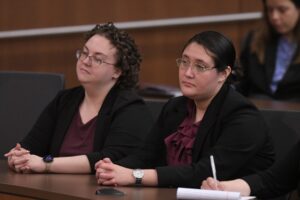Behind Their Public Duties: Two City Officials Tell Compelling Personal Stories at Lubar Center Programs
Sometimes, the personal stories of public officials can be self-serving and just plain not interesting. But sometimes they can be insightful and compelling, saying important things about the individuals, the work they do, and life more broadly.
Two recent “Get to Know” programs at Marquette Law School, hosted by Derek Mosley, director of the Lubar Center for Public Policy Research and Civic Education, were definitely in the latter category. Each spotlighted a person who holds an important job. But the biography of each – and their life stories are very different — says a lot about the character of Milwaukee and the challenges the city faces.
Aaron Lipski, chief of the Milwaukee Fire Department, spoke with Mosley on Oct. 9, 2025. He has been in the news often in recent times, including for his strong advocacy of putting sprinklers in older apartment buildings in the light of fatal fires and for his call for the Milwaukee city budget to sharply increase spending on new trucks and equipment for the fire department.

